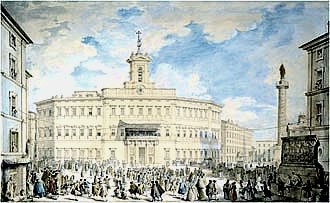Lottery of the Pope

The seven hundred saw Rome as a festive city, there has been a reawakening for the theatrical performances and so open up the small and large theaters like d'Alibert, Capranica and after 1732 Theatre Argentina, but the feast does not is only for the wealthier classes even common people has its festivities in the square but fun is mainly in the game; in homes, taverns but also in the squares they play dice and cards but one of the pastimes open to all, rich and poor, becomes the lottery finally made legal by Pope Clement XII in 1731.
The Lotto game had arrived in Rome as early as the Renaissance but its origin appears to be Dutch; the first extraction was made in the vicinity of Amsterdam to resolve the issue of selling some properties not easily divisible. The "lot" was the prize but with time came to denote the game and unusual thing European languages have terms phonetically similar to indicate the prize; by frank "lot", the Germanic "Hleut" Dutch "lot", the German "los", the Danish "lod" English "lot", the Spanish "lote" all still with their own linguistic matrix which refers to the original meanings, to select, extract but also of chance, fate, division of property, stocks of goods.
The game was very popular in Rome in the second half of XVII century, but Pope Benedict XIII forbade it in 1725 because it was considered immoral and pilgrims who would come for the Holy Year should not witness the spectacle of the citizens of Rome as fans over game of the faith; the pope also wanted to end the widespread practice of private lotteries where unscrupulous merchants put up for grabs jewelry, works of art but also real estate without it being possibility of checks on the correctness of the extractions.
But they continued to play in a clandestine manner and to stop it Innocent XIII issued in 1727, a measure that placed over the lottery ban also tremendous penalties for anyone caught playing illegally: for the prelates' a divinis "suspension and for all other excommunication and One could not even get rid of sin through confession because in these cases absolution could be given only after the Pope's permission.
The Romans, however, continued to play and so only four years after the new Pope Clement XII was forced to readmit that between authorized games, even to get stronger revenues at that time needed to pass a serious moment of instability of the papal finances. They were given precise rules: nine extractions year with five winning numbers every time. The extraction was done by an orphan boy whom the people called "rufianello" perhaps because he believed agree with the officials; it is estimated that the winners then went about 25% of the bet money on, you can also understand because Pope Clement XII was expecting to swell the papal finances. Since February 1743 the place dedicated to the Lotto draws became the balcony of the Palace of Montecitorio, then Curia Innocenziana headquarters of the Court of Justice ...
Sign up and read the rest of the article!
by M.L. ©ALL RIGHTS RESERVED (Ed 1.0 - 02/09/2016)






